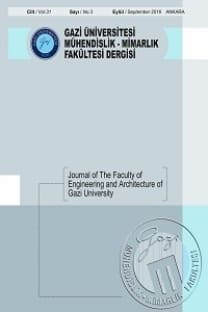Ohrid Gölündeki Su Kalitesinin Değerlendirmesinde Diatome Ve MAKROFİT Endekslerinin Kullanılması
Biyolojik Gözlem, Diatom Endeksi, Makrofit Endeksi, Besin, Su kalitesi.
___
- Carbiener R., Trémoliéres, M., Mercier, J.L., Ortscheit, A., Aquatic macrophyte communities as bionindicators of eutrophication in calcareous oligosaprobe stream waters (Upper Rhine plain, Alsace). Vegetatio 86, 71-88. 1990.
- Cleve-Euler A. 1955 Die Diatomeen von Schweden und Finnland, Teil I bis V. Almqvist & Wiksells Boktryckeri AB, Stockholm, 1955.
- Cox E.J. What is the basis for using diatoms as monitors of river quality? Proceedings of an International Symposium (Eds: B. A. Whitton, E. Rott, G. Friedrich), Landesamt fűr Wasser und Abfall Nordrhein – Westfalen, Dösseldorf, 33 – 40. 1991.
- John J. Bioassessment on health of aquatic systems by the use of diatoms, in Modern Trends in Applied Aquatic Ecology (Eds: R. S. Ambasht, N. K. Ambasht), Kluwer Academic Publications, New York, 1 – 20. 2003.
- Kelly M.G., Cazaubon A., Coring E., Dell`Uomo A., Ector L., Recommendations for sampling littoral diatoms in lakes for ecological status assessments. 1998.
- Kelly M.G., Whitton B. Plants for monitoring rivers, R&D note 366, National Rivers Authority, Bristol. 1995.
- Kolkwitz R., Marsson M. Őkologie der pflanzlichen Saprobien, Berichte der Deutschen Botanischen Gesellschaft, 26a, 505 – 519. 1908.
- Kovacs C., Kahlert M., Padisak J. Benthic diatom communities along pH and TP gradients in Hungarian and Swedish streams, J. Appl. Phycol, 18, 105 – 117. 2006.
- Krammer K., Lange-Bertalot H., Subsswasserflora von Mitteleuropa. 2/1: pp. 876; 2/2: pp. 596; 2/3: pp. 576; 2/4: pp. 437; 2/5: Fischer, Stuttgart. 2001.
- Kupe L., Vleresimi i gjendjes mjedisore te disa habitateve ujore shqiptare mbeshtetur tek diatomete. Disertacion, Faculty of Agronomy, Tirana Agricultural University, 134 pp. 2006.
- Kupe L., Kurti D., Imeri A., Cara M., Kalajnxhiu A., Dodona E., Hasanlliu R. a “A floristic data of diatoms from Ohrid Lake”. International Conference of Agriculture, Food and Environmental, 27-28 May 2011, Korçë, pg. 159-160. ISBN: 978-9928-4055-7-9. 2011.
- Kupe L., Miho A., Çullaj A., Evaluation of Trophic and Saprobic Index in Albania Rivers, Environ. Appl. & Sciences, 6: 5. 2011b.
- Lund J.W.G., Kipling C., Lecren E. D., The inverted microscope method of estimating algal numbers and the statistical basis of estimations by counting, Hydrobiologia, 2, 143 – 170. 1958.
- Melzer A., Die Gewässerbeurteilung bayerischer Seen mit Hilfe makrophytischer Wasserpflanzen. In: Kohler, A., Rahmann, H. (Eds.), Hohenheimer Arbeiten-Gefährdung und Schutz von Gewässern. E. Ulmer, Stuttgart, pp. 105–116. 1988a.
- Melzer A., Der Makrophytenindex-Eine biologische Methode zur Ermittlung der Náhrstoffbelastung von Seen. Habilitationsschrift der TU Műnchen. 1988b.
- Melzer A., Die Ermittlung der Náhrstoffbelastung im Uferbereich von Seen mit Hilfe des Makrophytenindex. Műnchener Beiträge Abwasser Fischerei- Flußbiologie 47, 156–172. 1993.
- Miho A., Tase D., Overview on diatoms from Ohrid Lake. Balwois, 2004, Ohrid-Macedonia. Pg 1-9. 2004.
- Miho A., Witkowski A., Diatom (Bacillariophyta) Flora of Albania Ciastal Wetlands Taxonomy and Ecology: A Review. Proceedings of the California Academy of Sciences. Vol. 56, No.12. pp. 16, 2005.
- Pascher A., Süßwasserflora von Mitteleuropa, Heft 10, Jena 1930, 1976.
- Prygiel J., Carpentier P., Almeida S., Coste M. et al., Determination of the biological Diatom Index (IBD NF T 90-354): results of an intercomparison exercise, J. Appl. Phycol. 14, 27 – 39. 2002.
- Prygiel J., Whitton B. A., Bukowska J. Use of algae for monitoring rivers III, Agence de l'Eau Artois-Picardie, Douai Cedex, France 1999.
- Rott E., Hofmann G., Pall K., Pfister P., Pipp E. Indikationslisten fűr Aufwuchsalgen. Teil 1: Saprobielle Indication, Bundesministerium f. Land- und Forstwirtschaft, Wien, 1 – 74. 1997.
- Rott E., Pipp E., Pfister D., Van Dam H., Ortler K., Binder N., Pall K. Indikationslisten fűr Aufwuchsalgen in Ősterreichischen Fließgewássern, Teil 2:Trophieindikation. Bundesministerium f. Land-und Forstwirtschaft, Zahl 41.034/08-IVA 1/97, Wien, 1-248. 1999.
- Rott E., Pipp E., Pfister P. Diatom methods developed for river quality assessment in Austria and a cross-check against numerical trophicindication methods used in Europe, Algological Studies, 110, 91 – 115. 2003.
- Round F.E. Use of diatoms for monitoring rivers, Proceedings of an International Symposium (Eds: B. A. Whitton, E. Rott, G. Friedrich), Landesamt fűr Wasser und Abfall Nordrhein – Westfalen, Dűsseldorf, 25 – 32. 1991.
- Seele J., Goos F.M., Raeder U., Entwicklung und Architektur von Diatomeengesellschaften auf Kunstsubstrat in einem oligotrophen See. In: Deutsche Gesellschaft fűr Limnologie (DGL), Tagungsbericht 1997 (Frankfurt). DGL-Eigenverlag, Krefeld, pp. 291–295. 1998.
- Seele J., Mayr M., Staab F., Raeder U., Combination of two indication systems in pre-alpine lakes diatom index and macrophyte index. Ecological Modeling 130,.145–149. 2000.
- Shannon C. E., Weaver W., The mathematical theory of commmunication, Univ. Illinois Press, Urbana. 1949.
- Tüxen, R., Preising E., Grundbegriffe und Methoden zum Studium der Wasser-und Sumpfpflanzengesellschaften. Dtsch. Wasserwirtsch. 37: 10–17 & 57–69. 1942.
- Van Dam H., Martens A., Sinkeldam J., A coded checklist and ecological indicator value of freshwater diatoms from the Netherlands. Netherlands Journal of Aquatic Ecology, 28, 117-133. 1994.
- Whitton B.A., Rott E., Friedrich G., Use of Algae for monitoring rivers, Institut fűr Botanik, Universität Innsbruck, 1991.
- ISSN: 1300-1884
- Yayın Aralığı: 4
- Başlangıç: 1986
- Yayıncı: Oğuzhan YILMAZ
Uzaktan Algılama Uydu Görüntüleme Sistemleri İçin Sinyal Gürültü Oranı Hesaplama Yöntemi
Mustafa TÜRKMENOĞLU, Orhan ŞENGÜL, Erdem DEMİRCİOĞLU
Gama Tipi Serbest Pistonlu Bir Stirling Motorunun Dinamik Ve Termodinamik Analizi
Halit KARABULUT, Hamit SOLMAZ, Melih OKUR, Fatih ŞAHİN
ÇEVRESEL ATIKLARIN YAPI MALZEMESİNDE DEĞERLENDİRİLMESİ
Ayşe MURATHAN, Taha ABDULKAREM A., Abdurrahman ASAN
AISI 316Ti Paslanmaz Çeliğin Tornalanmasında Kesici Uç Etkisinin Taguchi Yöntemi ile Analizi
